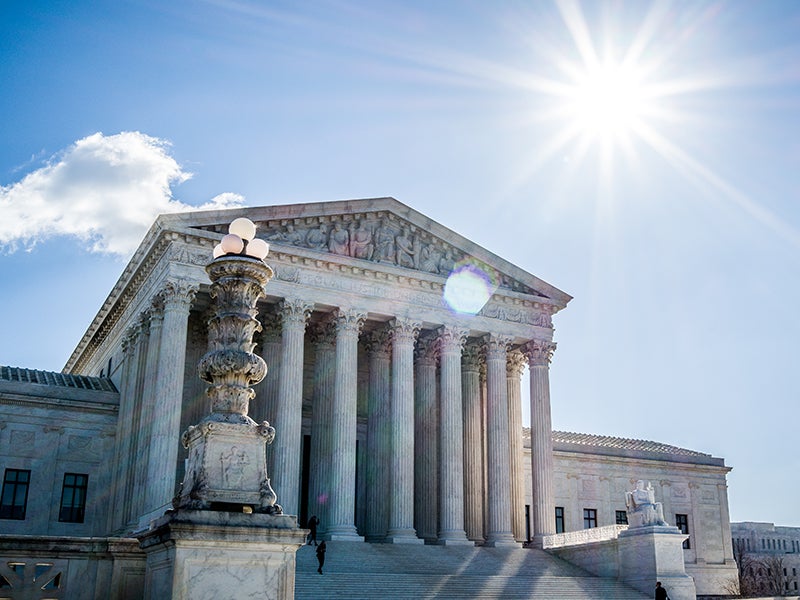Supreme Court to Hear Oral Arguments on Cross-State Ozone Pollution
Blocking the Good Neighbor Plan would be extraordinarily harmful
Contact
Today, the Supreme Court will hear arguments on applications to halt the government’s Good Neighbor Plan, an Environmental Protection Agency (EPA) rule under the Clean Air Act. The Good Neighbor Plan will save thousands of lives by requiring upwind states to limit pollution that travels across state lines, harming people and the environment downwind. Those health benefits would be delayed or lost entirely if the Supreme Court halts the plan.
The EPA proposed the Good Neighbor Plan in response to an Earthjustice lawsuit and eventually passed it in early 2023. Using its statutory authority under the Clean Air Act and a methodology the Supreme Court has previously upheld, the EPA ordered big industries in upwind states to adopt technology that controls their air pollution emissions. The D.C. Circuit denied requests to block the plan during litigation, and that court is proceeding with its regular review. But Republican-led states, fossil fuel industry groups, and utilities filed “emergency” requests with the Supreme Court in a last-ditch effort to avoid cleaning up their pollution.
“The Supreme Court is doing something extraordinary today: it is holding an emergency session to consider blocking a Clean Air Act regulation that would save thousands of lives,” said Earthjustice Senior Vice President Sam Sankar. “Over and over, the Supreme Court is going out of its way to second-guess EPA’s scientific judgments at the request of polluting industries. Our courts should not work this way.”
The Good Neighbor Plan requires power plants and other high-polluting industries to reduce emissions that create ground-level ozone, commonly known as smog. Polluters in upwind states like Ohio and Indiana must reduce their contributions to dangerous smog levels in downwind states like Connecticut and Wisconsin. Smog can cause asthma, respiratory illness, and premature death. EPA estimates that the plan, when fully implemented, will prevent more than one million asthma attacks and at least a thousand premature deaths each year, and improve the health of forests and waterbodies around the country.
Earthjustice and its clients have defended the Good Neighbor Plan in court for years. Clients include Air Alliance Houston, Appalachian Mountain Club, Center for Biological Diversity, Chesapeake Bay Foundation, Downwinders at Risk, Louisiana Environmental Action Network, Sierra Club, Southern Utah Wilderness Alliance, and Utah Physicians for a Healthy Environment.
Quotes from our clients
“Houston continues to be one of the smoggiest and sootiest cities in the country,” said Air Alliance Houston Executive Director Jennifer Hadayia. “Our local pollution sources are both exacerbated by and contributors to pollution blowing in and out from other states. The EPA’s Good Neighbor Plan is vital for public health in Houston, providing a layer of protection from external pollution sources, and holding our own local industry accountable to the harm it causes to our neighbors across the Gulf South. We urge SCOTUS to follow years of precedent for the health of our communities and safeguard our right to clean air. Texans want to be good neighbors. This Plan makes sure that industry is a good neighbor, too.”
“The EPA’s Good Neighbor Plan is critical for protecting public health in the Appalachian Mountains and nearby communities,” said Appalachian Mountain Club Senior Scientist Georgia Murray. “Industry attempts to undermine this rule, threaten the health of people who are active outside in this region, and worsen the condition of our waterways and forests. The EPA should be able to do its job and regulate contributing air pollution that some upwind states are unwilling to curtail.”
“Air pollution is a public health scourge that harms everyone. It shortens the average person’s life expectancy and is also directly responsible for the deaths of tens of thousands of our patients every year,” said Utah Physicians for a Healthy Environment Board President Dr. Brian Moench. “Attacks on EPA’s Good Neighbor Plan are a callous and indefensible capitulation to industry lobbyists that victimizes everyone else.”
“The health of the Chesapeake Bay ecosystem and the people living in its watershed depends on clean air,” said Chesapeake Bay Foundation Director of Litigation Ariel Solaski. “This assault on the EPA’s Good Neighbor Plan puts public health at risk and undermines the progress made restoring the Bay and its tributaries.”
“Utah’s wild places are well known for their wildlife, clean air, and remarkable vistas – all of which are threatened by smog and ozone pollution,” said Southern Utah Wilderness Alliance Attorney Hanna Larsen. “It’s unacceptable to see Republican politicians choosing to side with polluters and their attempts to stop the EPA’s Good Neighbor Plan, which would reduce pollution, help preserve ecosystems, and protect public health. By fighting measures like this, politicians will degrade our environment and endanger the health of Utahns now and into the future.”
“This case is about basic fairness &mndash; it’s not fair to force people in downwind states to breathe unhealthy air simply because polluters in upwind states refuse to install and operate basic air pollution controls,” said Sierra Club Senior Attorney Zachary Fabish. “Congress directed EPA to ensure that states are good neighbors, and that’s what the Good Neighbor Plan does.”
“The EPA’s Good Neighbor Plan is essential for safeguarding public health and protecting vulnerable plants and wildlife,” said Center for Biological Diversity Attorney Ryan Maher. “Industry’s efforts to dismantle this rule prioritizes profits over people. We must defend this crucial regulation for the well-being of all.”

Additional Resources
About Earthjustice
Earthjustice is the premier nonprofit environmental law organization. We wield the power of law and the strength of partnership to protect people's health, to preserve magnificent places and wildlife, to advance clean energy, and to combat climate change. We are here because the earth needs a good lawyer.